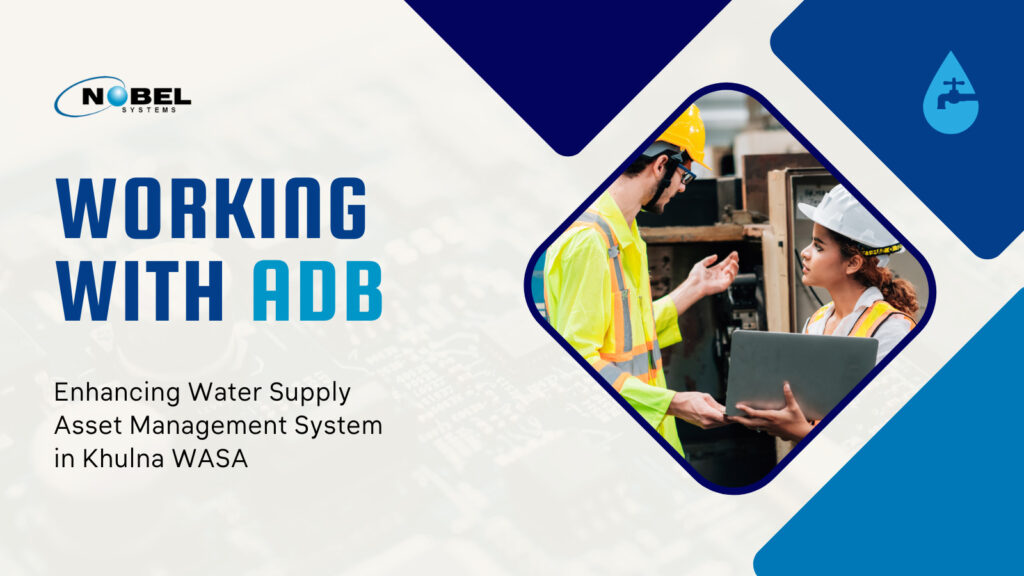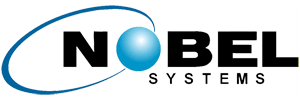Nobel Systems is pleased to share that it has been selected for a project funded by the Asian Development Bank (ADB). This project aims to enhance the asset management practices in the water sector by enabling Khulna WASA (KWASA) in Bangladesh to adopt a GIS-based water supply Asset Management System (AMS) solution.
One of the objectives is to promote quality infrastructure investments that are green, sustainable, resilient, and inclusive in selected developing member countries (DMC). It will support the identification and preparation of asset management initiatives in the water and other sectors, as well as the knowledge and capacity development of DMCs in asset management. It will also enhance the digitalization of infrastructure asset data and the use of digital tools for evidence-based decisions.

Supporting KWASA
This project aims to help KWASA improve its asset management in the water sector by adopting a GIS-based solution. KWASA’s current asset management practices, inventory, maintenance, condition assessment, and data collection methods have been evaluated and a customized roadmap has been proposed to address the gaps and enhance operational and financial efficiency. This will also support KWASA in developing a comprehensive Asset Management System (AMS) in the future.
WASA provides safe and reliable drinking water to around 1 million people in Khulna. A GIS-based asset geodatabase will facilitate KWASA’s daily operation and maintenance activities and enable long-term planning, non-revenue water reduction, water demand management, and other operation and maintenance (O&M) processes and procedures.
Nobel Systems will provide KWASA with a GIS-based water supply asset management system (KWAMS) that includes a geodatabase of all assets and their attributes, hardware, and training. Nobel Systems will deliver four reports: an Inception Report with an action plan and methodology, a System Design Report with AMS design details, a System Implementation Report with the results of the system deployment, and a Training Program with the summary of the training and capacity building activities.
Nobel Systems’ Scope of Work
In the context of the project outlined, the proposed approach entails the development of a GIS-based water supply geodatabase to fulfill the specific requirements of KWASA. This comprehensive geodatabase will encompass all water supply assets along with their associated attributes and will be divided into three distinct phases. It is crucial to emphasize that all data, whether raw, processed, or derived, will remain the sole property of KWASA throughout the entire project.
The first phase, Task 1, will involve the design and implementation of a web-based GIS application known as the Khulna Water Asset Management System (KWAMS). KWAMS will reside in a cloud-based virtual machine, accessible via the internet, catering to a diverse range of user profiles. This system will encompass a wide array of water supply assets, from reservoirs and treatment plants to pipelines, valves, and customer connections.
Notably, KWAMS will introduce a conceptualization of the water system as an oriented graph, highlighting connectivity and hierarchical relationships between assets. This approach ensures that the system can adapt to the complex nature of the water supply network while allowing for future expandability and scalability. Furthermore, the system will feature essential functions such as data visualization, topological queries, data export, secure user access, and ease of use for non-GIS technical staff.
The web-based user interface of KWAMS, as outlined in the project specifications, will be equipped with features such as dynamic linkage to aerial orthophotos, map navigation tools, property search capabilities, support for various media types, and tools for measuring and printing maps. Additionally, it will include network topology functionality, aiding in the isolation of mains for maintenance or emergencies and facilitating decision-making processes related to the water supply network.
Task 2 focuses on the initial implementation of KWAMS for the entire water supply system, necessitating the conversion of AutoCAD files into a shape file format and the manual addition of asset attributes. Task 3, on the other hand, delves into a detailed implementation of KWAMS for one pilot area, with a focus on customer-related asset information. This includes locating customer meters, gathering customer data, and documenting service connections for the pilot area.
Upon the successful completion of Task 3, the firm will be required to submit a comprehensive final report that summarizes the work accomplished, the level of completeness achieved, explanations for any data gaps, and recommendations for future steps in the development of AMS. This systematic and well-structured approach aims to deliver a robust, user-friendly, and expandable geodatabase solution that meets the evolving needs of KWASA for effective water supply management.
Water Utility Solutions
Nobel Systems, a prominent provider of cloud-based solutions specializing in water quality monitoring, leak detection, and GIS mapping, among other services, has forged a collaborative partnership with the Asian Development Bank (ADB). This collaboration entails the implementation of Nobel Systems’ flagship software, GeoViewer, within various water utility initiatives across Asia.
A notable endeavor that Nobel Systems has actively participated in is the Lekhnath Water Supply User Committee (LWSUC) project in Nepal. LWSUC, a community-based organization responsible for managing and maintaining water supply services for approximately 40,000 residents in the Lekhnath municipality, has integrated smart meters and pressure sensors into its infrastructure. Simultaneously, the deployment of GeoViewer, facilitated with support from ADB and Nobel Systems, allows for the collection and analysis of pertinent data. The utilization of GeoViewer has significantly enhanced LWSUC’s operational efficiency, led to a reduction in non-revenue water, and notably improved service quality.
Another noteworthy initiative championed by Nobel Systems is their collaborative engagement with the City of Chirchiq in Uzbekistan. Chirchiq, a city home to around 170,000 inhabitants, grapples with challenges such as aging infrastructure, substantial water losses, low water pressure, and frequent service interruptions. In close partnership with ADB, Nobel Systems has introduced GeoViewer and other smart technologies to bolster water management within the city. GeoViewer’s real-time monitoring capabilities for water pressure and flow, leak detection and localization, and optimization of pump operations have significantly contributed to the city’s efforts in minimizing energy consumption, operational expenses, and greenhouse gas emissions.
Nobel Systems takes immense pride in its association with ADB and its developing member nations, striving to enhance their water management practices and actualize their sustainable development goals. To acquire comprehensive insights into Nobel Systems, its array of products, and services, interested parties are encouraged to explore the company’s official website at nobel-systems.com or establish contact via email at info@nobel-systems.com
